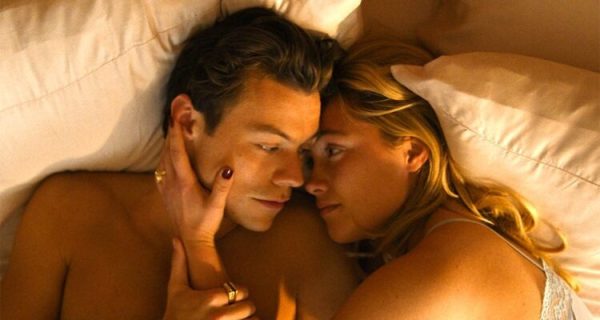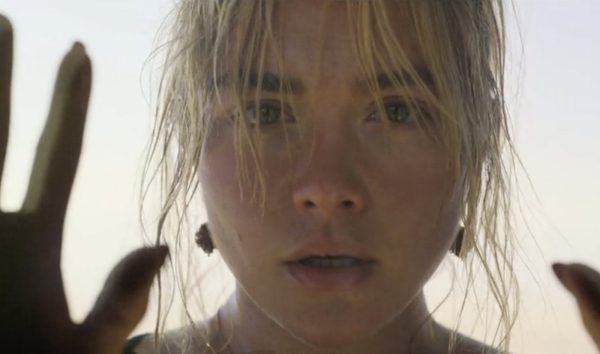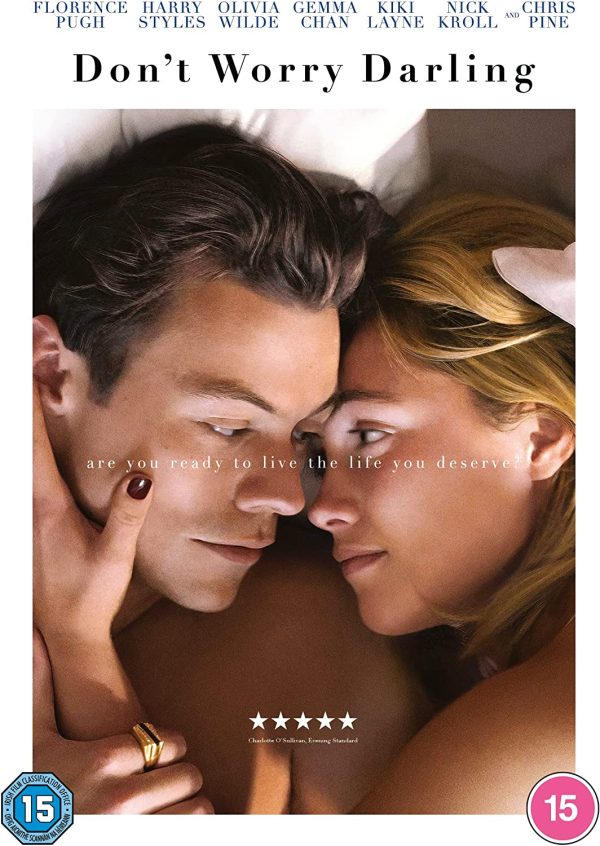Don’t Worry Darling, 2022.
Directed by Olivia Wilde.
Starring Florence Pugh, Harry Styles, Chris Pine, Olivia Wilde, Gemma Chan, KiKi Layne, Nick Kroll, Kate Berlant, Douglas Smith, Ari’el Stachel, Asif Ali, Timothy Simons, Sydney Chandler, Wylie Quinn Anderson, Mariah Justice, Michelle Ells, and Marcello Julian Reyes.
SYNOPSIS:
A 1950s housewife living with her husband in a utopian experimental community begins to worry that his glamorous company could be hiding disturbing secrets.

For a film in which the narrative driving force is asking the protagonist to peer beyond the literal and metaphorical horizons of their own existence, so too must the audience attempt to overlook all of the tittle-tattle timeline nonsense that Don’t Worry Darling comes burdened with in order to try and embrace the ambition of Olivia Wilde’s sophomore feature.
Do that and you’ll find a lot to admire among the breadcrumb trails she weaves throughout this lusciously rendered utopian nightmare. It’s just a shame that beyond a phenomenal Florence Pugh performance and some ‘hang it in the Louvre’ shots, the myriad of ideas and intrigue don’t really lead to anything indelible.

What’s clear from the moment you pull up into this Truman Show style enclave of identikit houses with families to boot, is that the viewfinder Wilde employed so impressively in Booksmart (think swimming pool scene or the stop-motion sequence) has evolved, with the assistance of Requiem for a Dream’s cinematographer Matthew Libatique, to capture some beautiful shots befitting of the largest canvas you can find to watch them on.
The finale in particular invokes the iconic imagery of North by Northwest, and even if you’re not invested in the intended thrills of that climactic sequence, at least you’re left with the thought that Florence Pugh is soon going to be knocking it out of the park against a desert skyline once again in Denis Villeneuve’s Dune sequel.
Married wonderfully with the meticulous way in which the film is shot is John Powell’s unsettling score. Bewitching and ethereal, it pops up to accompany the Suspiria-style visual beats and punctuates the many moments in which Pugh journeys towards madness or an awakening.
As you can tell from the multiple comparison points offered up so far, Don’t Worry Darling leans heavily into its influences, with the feminist horror of The Stepford Wives an obvious template upon which contemporary issues can be built. Although that’s a damning indictment in itself because not a lot appears to have changed for the women of either world since Ira Levin’s novel was released in 1972.
Strip away the Westworld sci-fi and Twilight Zone mystery and the overriding arc of Don’t Worry Darling is a relatively simple and easy to get behind fable of female agency, that culminates in a ‘oh, is that it?’ twist which attempts to tie-up threads with sledgehammer subtly during a number of third-act exchanges.
One such sequence, perhaps the standout of the entire film, is a dramatic dinner table exchange that will elicit chuckles, draw gasps, and cause clenched fists. It features the devilishly good Chris Pine sitting at the head of the table, the smiling patriarch watching on as the fracture lines begin to appear in his seemingly perfect world. A little more Pine would have gone a long way, particularly following the film’s big reveal.
None of this would work without Florence Pugh doing most of the heavy lifting. She imbues Alice with so much emotional weight that isn’t necessarily earned by the script or character development, but is so affecting in the way she delivers her lines that you feel her every word, ultimately willing her to push back against the oppression. As for Harry Styles, it was perhaps unfair to put him up against such a screen-encompassing performer as Pugh, but for those keeping score he is perfectly fine in the role.
Don’t Worry Darling certainly looks the part, firmly cementing Wilde as an accomplished big-screen director, but scratch beneath the surface of its freshly cut lawns and beautiful superficiality and you’ll find a psychological thriller that never really delivers on its mystery-laden set-up, despite an unmissable performance from Pugh.
Flickering Myth Rating – Film ★ ★ ★ / Movie ★ ★
Matt Rodgers – Follow me on Twitter















